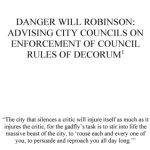local government
There are eight steps to processing ordinary motions in Robert’s Rules. Download PDF At the right time in the agenda, after the member has been recognized by the chair, A member makes a motion. Another member seconds the motion. The chair states the motion. Members discuss and/or amend the motion. The chair restates the motion…
Taking the time to construct a powerful agenda will make a big difference to your meetings. Avoid these agenda mistakes: An agenda that would take two days to get through, not two hours. An agenda that fails to assign suggested time limits for discussion. An agenda that is emailed at 6:00 am for a 7:00…
Updated July 19, 2021 One of the most useful tools for efficient meetings is a “consent agenda.” This is a single item of business on a regular agenda that includes several items bundled together. The items cannot be discussed or debated. They are approved with a single vote. To learn about agendas in general, read…
There are half a dozen things that DO NOT BELONG in your minutes. Here they are. 1. Things that didn’t happen don’t belong in the minutes This may sound unlikely, but we have seen instances where after the meeting, the chair or a board member wants to put something in the minutes that didn’t actually…
Today is our primary election in Washington State. Seattle Times writer Kate Riley has published an insightful column about “my favorite politicians.”
Updated November 19, 2022 What can you do when a chair (presiding officer, person running the meeting) refuses to follow Robert’s Rules, abuses their power, or acts in an arbitrary manner? The first step is to make a Point of Order bringing the error to the chair’s attention. If the chair rules against you, you…
In general, people who serve on nonprofit boards or in local government are peaceful and compliant. But every once in a while, you get a rogue board member. What can be done? We believe that it’s important for boards to be prepared to sanction rogue members when necessary. Download PDF This is an unpleasant subject.…
Guest post by Tami A. Tanoue, CIRSA Executive Director Those who have been working with municipalities for an extended period have observed a phenomenon that occurs at the governing body level. Let’s call this phenomenon the Outlier Syndrome.
This post offers our readers a brilliant paper by municipal attorney Brett Vinson on the dangers of public comment. Anyone involved in receiving comment from the public during meetings will find it interesting and valuable. Read about the Nazi salute in Santa Cruz, singing a Whitney Houston song to express love for a councilmember, and…
Guest post by Bob Jean, ICMA/WMCA Senior Advisor Got a really hot issue and a divided community? Too often, if you hold a traditional public hearing to deal with it, you run the risk that each side will simply line up and use their three minutes to tell the Council how terrible they are no…










